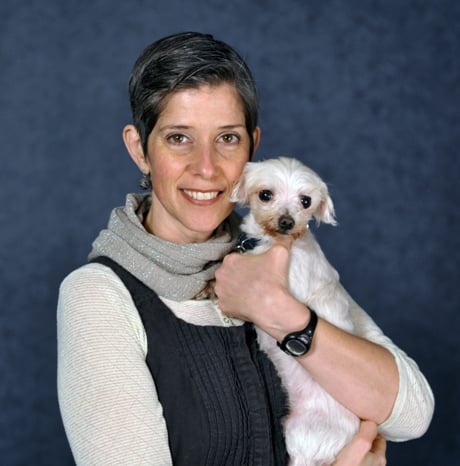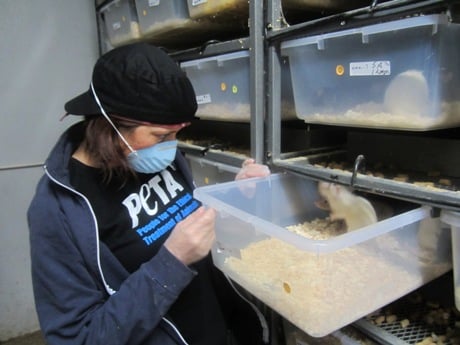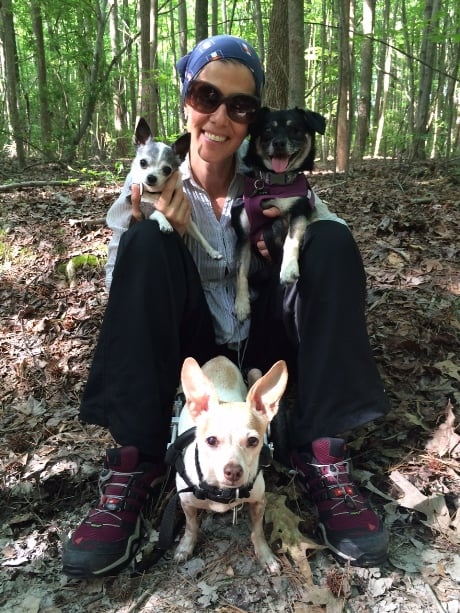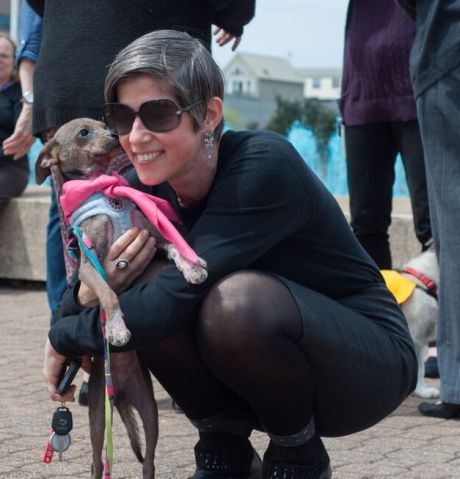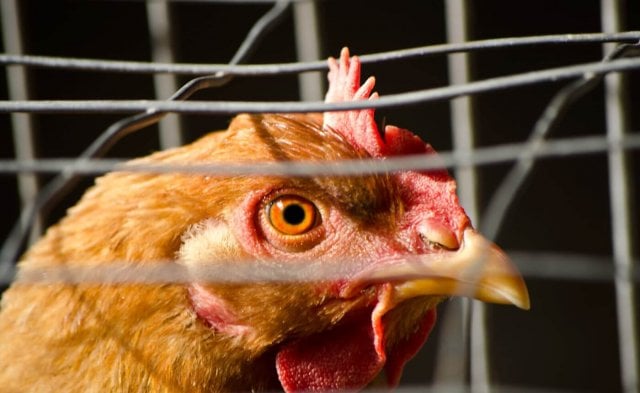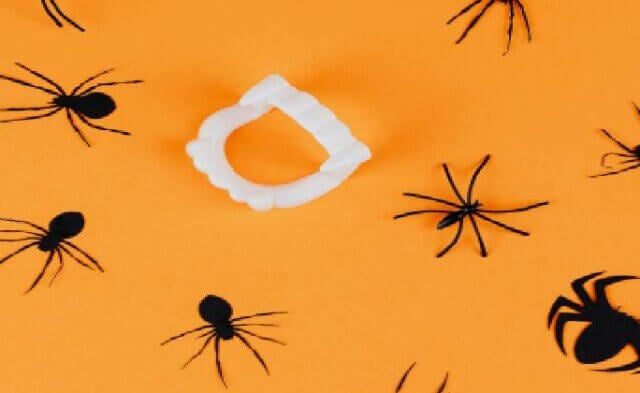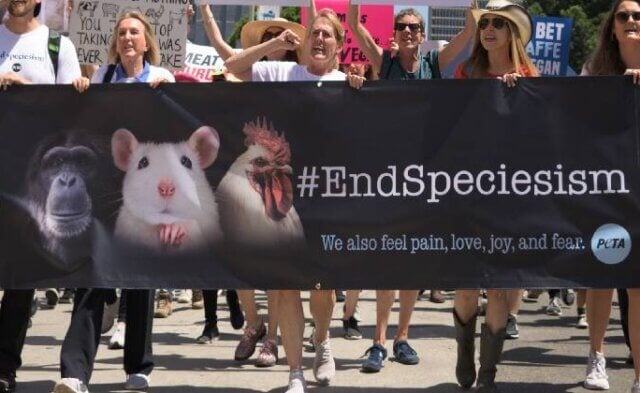Daphna Nachminovitch oversees several vital departments at PETA: our Mobile Clinics Division, our Community Animal Project, our Emergency Response Team, and The Eye—which carries out our eyewitness investigations and allows the public to see what happens to animals behind the closed doors of laboratories, breeding facilities, exotic-animal dealers, slaughterhouses, and more.
Investigations directed by Daphna have led to numerous firsts in U.S. history, including the first time that workers faced felony cruelty charges for abusing animals in a laboratory, the first convictions of factory farm employees for abusing pigs in Iowa (the top pig raising state in the U.S.), the first felony indictments for abusing factory-farmed birds, and the stiffest penalty ever imposed for cruelty to any farmed animal. She also oversaw an investigation that led to just the second time in U.S. history that an entire animal testing facility closed as a result of animal rights work.
Augustus Club: How did you become involved in animal rights?
Daphna Nachminovitch: I went vegetarian when I was 16, after I made the connection between our family dogs and the animals we ate. A year later, I became a member of PETA. In 1994, I read Free the Animals by Ingrid Newkirk, and it inspired me to write her a letter. Little did I know that she would soon become my mentor.
AC: What was your first job at PETA, and how did it come about?
DN: I was living in Chicago, and I contacted PETA about a horrible pet store called Animal Jungle that kept exotic animals in cruel conditions. A cruelty caseworker named Erica called me back, and that began a series of phone calls in which she gave me guidance on how to document the abuses there. (Fun fact: I took a video camera into the store to record the conditions, and not surprisingly, the sales clerk told me to turn the camera off. But since I am originally from Israel and speak Hebrew, I pretended to be a tourist who didn’t speak English and just kept recording.)
One day, I called Erica after hours and got PETA’s voice-mail system, which offered an option to hear a list of job opportunities. I applied to be a cruelty caseworker, and not long afterward, I was living in Norfolk and working right next to Erica.
AC: You helped start PETA’s Community Animal Project (CAP). How was CAP created?
DN: While I was a cruelty caseworker in the late 1990s, a coworker reported a trailer park in nearby Virginia Beach in which a lot of dogs were living on chains. We worked to make conditions better for those dogs, including building pens so that they could at least be unchained. That was the genesis of CAP.
AC: Describe a facet of your job that makes you especially happy.
DN: Knowing that there is someone on call 24 hours a day to field cruelty calls and that we will go to the ends of the Earth to help an animal. We are the only national animal protection organization with a 24-hour emergency pager.
I’m also proud of the fact that PETA provides services where there are no other services. For example, our doghouses have our toll-free number stenciled on the side. One time, we got a call from a man in a rural town who saw our number on a neighbor’s doghouse and reported a dog with an embedded collar. We got custody of the dog and got the owner prosecuted for cruelty. The caller lived in a town with no animal control department and authorities that rarely responded to animal-related calls. If it hadn’t been for PETA, who knows how long that dog would have suffered?
AC: What is your most gratifying accomplishment in your time at PETA?
DN: The U.S. Global Exotics case, for sure. It was the largest seizure of animals in U.S. history—more than 26,000. That case occupied my every waking moment for months on end as we fought to get those animals out of there.
I went to Texas in July, and for months, I met with every possible law-enforcement agency, humane society, and animal control agency. In December, we finally got the animals seized.
There was a wide array of exotic species—from wallabies and lemurs to snakes and spiders. So we arranged for experts from all over the world, including reptile specialists and even a spider expert, to come and help us evaluate and house the animals appropriately. We worked with the SPCA of Texas and eventually got all the animals placed with rescue groups all over the country.
AC: Are there any personal anecdotes about PETA that you would like to share?
DN: PETA introduced me to four of my beloved canine family members: Gilli, Dovi, Agnes, and Elsie. They were all PETA rescues. I am so grateful to our members for helping PETA save these four angels and for supporting our work to save all animals from abuse and neglect.
PETA’s Shelter
PETA’s animal shelter—housed within the Sam Simon Center in Norfolk, Virginia—offers a comfortable, safe haven for animals rescued by our Community Animal Project (CAP) fieldworkers and animals saved during PETA’s eyewitness investigations of facilities that exploit animals.
In addition to placing animals in carefully screened, permanent homes, we transfer some animals to larger facilities, where they are put up for adoption. PETA also helps guardians keep their animal companions by offering training and behavior tips, helping to find animal-friendly housing, and assisting with medical and other care. In 2014, we provided approximately 4,000 families with veterinary and counseling services, helping them keep animals they were considering giving up!
For animals who are elderly, injured, ill, feral, or aggressive and for homeless animals turned away by other shelters and/or surrendered by citizens who had nowhere else to turn, PETA provides a painless way out of a pain-filled life through judicious use of euthanasia. We also offer free euthanasia services to people whose beloved animal companions are suffering but who can’t afford to pay for euthanasia at a veterinary office.
New Beginnings
Here are some of the many animals for whom PETA’s shelter was the turning point in their journey from dire straits to health and happiness.
Russell’s owner left him unprotected in the unfenced yard surrounding her trailer in rural North Carolina and surrendered him to CAP fieldworkers after he was so severely injured by another free-roaming dog that he couldn’t stand up or even move. Now he has a wonderful new home with a retired couple in Pennsylvania.
A woman in Portsmouth, Virginia, called PETA to report that her neighbor—who owned cats Calvin and Hobbes—had moved away and left them to starve. A CAP fieldworker brought them to our shelter, where they were soon adopted into loving homes.
Justice had spent his puppyhood outdoors on a chain. When CAP fieldworkers rescued him, they found that his collar—which had not been loosened as he grew had become embedded in his neck, leaving an infected wound. After he recovered, he was adopted by a couple in Washington, D.C., and he now enjoys the company of three canine and feline “siblings.”
Snickers and Oreo were rescued by CAP fieldworkers from a filthy, junk-filled trailer in North Carolina. There was very little room for them to run and play, and their only “toys” were cockroaches. They have now found their “forever home” with a lovely mother and son duo in the Philadelphia area.
Cora had been chained outdoors her entire life. CAP fieldworkers gave her a doghouse, had her spayed, and checked on her regularly. Then she was given to a new owner who allowed a chain to become embedded in her neck. After persuading him to surrender Cora, we found her a home in Maryland with a guardian who adores her.
Nigel was rescued by PETA from a hellish roadside zoo in Georgia, where he was going to be used as live snake food. He was being housed in a filthy plastic crate, his feet stained from standing amid his own waste. Nigel was transported to our shelter and has since been adopted by a PETA Foundation staffer.
PETA’s Community Animal Project
Every day and night, in all weather extremes, including hurricane conditions, nor’easters, and snowstorms, PETA’s Community Animal Project fieldworkers answer calls for help from people living in some of the poorest communities in southeastern Virginia and northeastern North Carolina.
Many of the dogs we see spend their entire lives isolated and alone, tethered by a heavy chain and sitting on the sidelines as life passes them by. We do everything we can to make their lives better, such as replacing heavy chains with lightweight tie-outs and swapping tight, makeshift collars with comfortable ones that fit. We also deliver free, sturdy, custom-built doghouses and straw bedding to those who would otherwise go without any protection.
We routinely visit these dogs in order to monitor their health and living conditions, improving both by treating them for fleas and other parasites, applying anti-flystrike ointment to their ears in the summer, providing water buckets, shaving matted fur, offering food, giving them a toy to play with, and showering them with affection.
This article was originally published in PETA’s Augustus Club newsletter. PETA’s Augustus Club is a complimentary club honoring those who are leaving a legacy for animals through a planned gift to PETA. If you have made a planned gift to PETA, please let us know so that we can thank you! If you have not yet left a legacy for animals but would like information on how to do so, please contact us.

